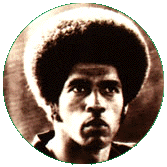Zombies, why do they work as a successful vehicle for human fear? Could it be the feeling of inevitability they represent? The fact that no matter how far we've come as a people, death is a constant companion in our day to day lives? Or maybe the mindless mass consuming all that it encounters is a truism that strikes a little too close to human nature. The holiday seasons especially brings this possible interpretation into sharp focus.
For whatever reasons zombies have enraptured movie going audiences for well over 80 years now. Films such as Des Cabinet des Dr. Caligari introduced early movie going audiences to the horror of a human stripped of self-control and bereft of the guiding moral compass. While not explicitly a zombie film, the somnambulist of the film has all the hallmarks of a modern day walking dead. This film paved the way for future horror directors and laid an important ground work for the break through zombie movies, 1968's Night of the Living Dead.
George Romero's view of a slow moving horde of undead terrorizing the world we live in has been remade many times, several by Romero himself, and is often used to represent whatever ill of society is most prevalent in the time period such films are produced. Zombies have been used as a political vehicle since the Cold War and Vietnam conflict to show us the horrors of our society as a whole. Powerful messages are often hidden within scenes of society's downfall to a swarm to shambling corpses.
Lately though zombie films have taken a turn much like the Western did in later years, turning the lens of the camera in on the genre itself, looking for elements of parody or self-reflection, distorting the original vision of some of the early films and looking for elements that can be pulled out and played upon. Shaun of the Dead is a particularly good example of this, what can now be called the zombie comedy (or zom-com for short). These zom-com films represent a paradigm shift in the zombie movie lexicon.
Parody is quite easily extracted from a genre that is given, as it quite often is, to excess. The heroes journey becomes not just one of survival, but of triumph, over the mindless monsters before them. Whereas the self-referential Western once showed that the myth of the cowboy as paragon of righteousness was a self-indulged fantasy, the zom-com breaks the myth of heroes as mere survivors.
Zombieland, which I have now seen a total of two times thanks to the wonderful Laurelhurst Theater, is a perfect example of this shift in genre perception. It is the story of two fellows and two ladies learning that there is more than just mere survival in a world overrun by the living dead.
I loved this film, quite simply it is one of the best zombie movies I have seen in years, and considering the last one I blogged about was 28 Weeks Later (which I won't even justify with a link), this movie far surpassed my expectations. The opening credit sequence alone is one that should not be missed and sets the tone for the rest of the story to come.
Zombieland tells the story of Columbus (Jessie Eisenberg) as a shut in attempting to make a life for himself following the uprising of the living dead. Despite playing a typical hapless nerd type character so common as a horror movie trope and doing his best Michael Cera impression, Eisenberg is immediately likable as the 'as down on your luck as you can get' Columbus. He lives through a strict set of rules he has dictated as necessary for surviving in a world overrun with corpses:
Rule #1: Cardio
Rule #2: Double Tap
The film does a wonderful job of showing time and again when these rules are applicable, flashing them across the screen in a way reminiscence of old public service announcements or in game tips in a video game. Columbus' rules put him at odds with Tallahassee (Woody Harrelson) a post-apocalyptic cowboy and avid Bill Murray fan.
Like Shaun of the Dead before it this movie has a much broader reaching genre than simply a zombie flick. Elements of the buddy comedy are sprinkled throughout as Columbus and Tallahassee attempt to reconcile their disparate lifestyles as they travel together. The introduction of Wichita (Emma Stone) and Little Rock (Abigail Breslin) is when the true revisionist image of Zombieland begins to take shape.
One of the classic formulas used throughout the zombie and horror genre in general is the group of survivors, grouped together through circumstance or necessity, begin to turn on each other as paranoia and the break down of law and society as a whole becomes an almost larger threat to the living than whatever terror hunts them.
Zombieland however turns this idea on its head. In it the characters, initially mistrustful and ready to betray each other at the drop of a hat, come to realize that in a world overrun by the dead that finding someone worth living for is better than just surviving. And along the way zombies die in many awe inspiring manners (read: crushed by a piano). I don't want to say too much more about this story, because since I supremely enjoyed this film I don't feel the need to write out the entire story to help people avoid seeing it.
At 81 minutes it is somewhat short for a modern cinema experience, but I feel like this movie was the perfect length for what director Ruben Fleischer was going for, and I walked out with a smile on my face, shaking my head at the film's fantastic finale. This movies gets high marks from me and I recommend it for anyone, be they zombiephiles or not.
Wednesday, October 28, 2009
Subscribe to:
Posts (Atom)
